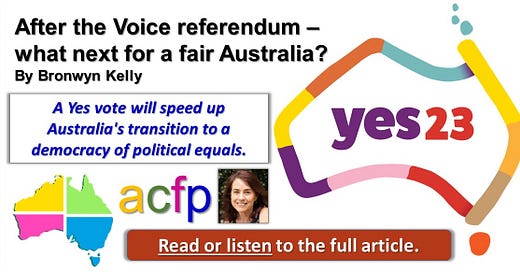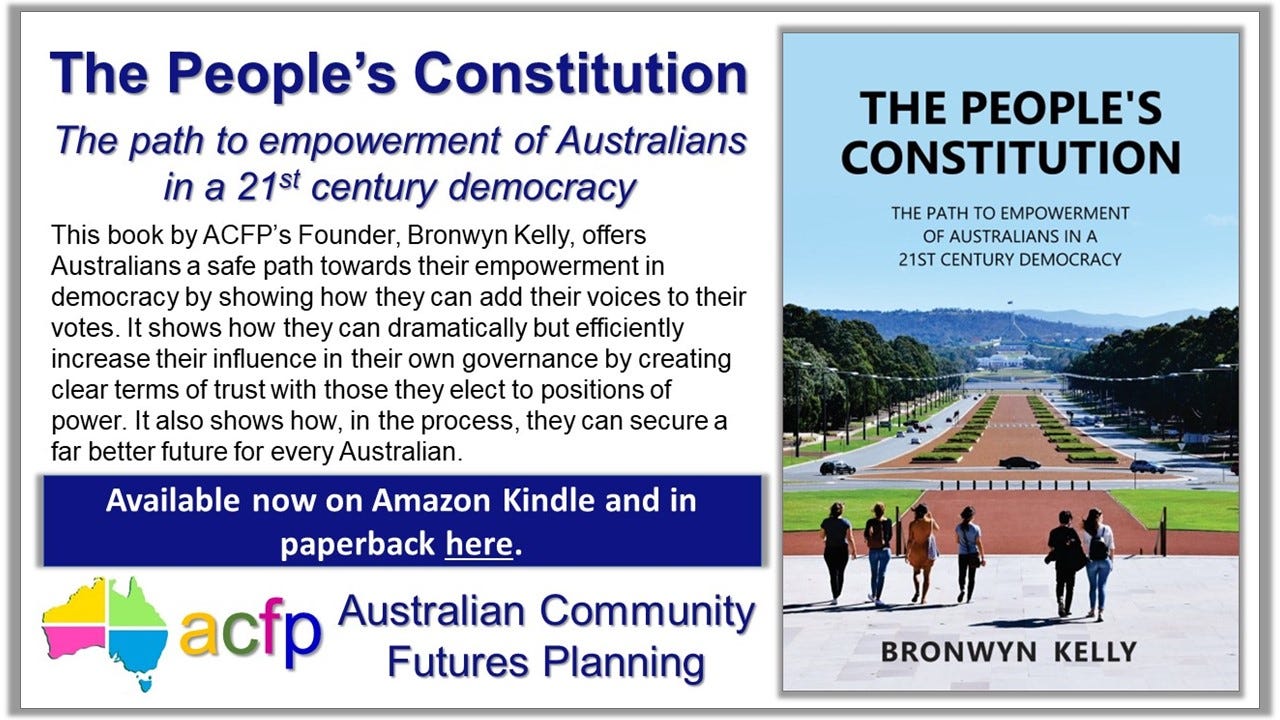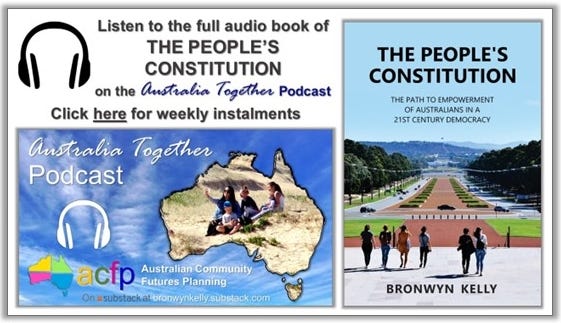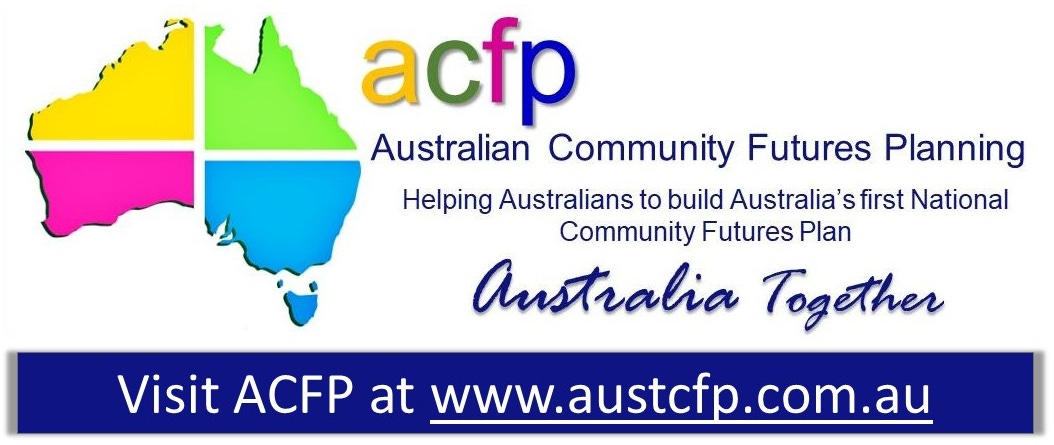After the Voice referendum - what next for a fair Australia?
A Yes vote will speed up Australia's inevitable transition to a democracy of political equals. A No vote will slow it down.
What is Australia’s character? Who are we as a society? What do we stand for? What do we want for our future?
After the referendum on the Indigenous Voice our answers to those questions will be changed. This is not to say that the multitude of answers Australians might offer in response to these questions has ever been assembled into a widely agreed picture of the nation’s character, values and aspirations. But still, no matter what the result is on 14 October 2023, Australians will have a new sense of themselves both as individuals and as a collective.
If they vote Yes, it will be open to them to think of themselves as members of a different type of nation than that established in 1901 in the Constitution. They may begin to think of the nation as one that has at last entered a new age of recognition of First Nations peoples. More than that, we will as a nation have acquired a new sense of the possibility of comity – a sense of the possibility of building an association for the mutual benefit of those who possessed and cared for the continent for millennia and those who later came to colonise and develop it for better and/or worse in European style. In essence, with a Yes vote it will be open to Australians to see themselves as having taken a substantial step towards building a community of political and social equals – that is, something we may justifiably characterise as “a democracy”.
If they vote No, it will not be possible to demonstrate a genuine commitment to that comity – not yet anyway. Rejection of a right for Indigenes to have a voice in their own governance may not amount to outright rejection of the possibility of reconciliation with and justice for First Nations or total rejection of the concept of mutually beneficial coexistent sovereignties, but it will certainly slow all that down, perhaps for decades. That may even be the intention of some No campaigners, but it will have a range of significant consequences for our ideas about ourselves and the nation we might want to belong to.
Chief among those consequences is that, for the present at least, it will not be possible to claim that we are a nation of equals who value fairness. Perhaps we never were, but at least there was some evidence in our most celebrated discourses and creative expressions of a sincere intention to create and sustain an idea of Australia as a democratic country where the political influence of each group is neither more nor less important than another’s. This has hitherto made it possible for Australians to credibly deny that unfairness is a feature of the national identity and value set. With a No vote, the justifiability of that denial will be lost, at least for the present.
In reality the claim to being a nation that values fairness was always tenuous, if only because Australia’s political system does not establish that we are members of a democracy. Instead our Constitution establishes Australia as nothing more than the colonial possession of a distant monarchy. Nothing in it creates a basis for fairness for the members of the nation established at Federation. The word “fair” is not mentioned, except in a clause about customs duties that ceased to apply before 1910. And no mention is made of democracy. Some might assert that we have both fairness and democracy because the Constitution mandates elections. But the right to vote in those elections is not guaranteed in the Constitution and, in any case, can be extinguished – and on the basis of race no less (under “Section 25: Provisions as to races disqualified from voting” and associated sections).
Nevertheless we might hope that a No vote would not be an irretrievable rejection of the possibility of a democratic coexistence of self-determining peoples – that is, people, groups and communities who have equal and secure claims to the most fundamental of all human rights, the right to self-determination. Were this right to be enshrined in the Constitution it would at last establish a firm basis for fairness in our political system. In its absence, though, our claim to be a people valuing fairness is quite hollow. A No vote in the Voice referendum can only make it more so.
Moreover, if Australians value self-determination – if they value the right to freely determine their political status and freely pursue their economic, social and cultural development – it ought to be acknowledged that a No vote will signal some degree of preparedness to forsake this fundamental right if the price of asserting it is that we might have to allow Aborigines and Torres Strait Islanders and non-Indigenous Australians to enjoy that right as equals. What that will say about who we are as a society is something that we have not said before – at least not openly, because there has been no national occasion directly asking us about it. But a No vote in this referendum will bring it out into the open. It will suggest a majority preparedness to live without fairness.
As Australians consider their vote in this particular referendum, it is open to them to consider the opportunities that may arise, or be missed, depending on the result. Inclusive types of constitutional reform like that proposed for the Indigenous Voice don’t come along often, but they are absolutely essential to our ability to transition to an enabling form of democracy where everyone has political equality and a greater share of influence over the decisions that affect them – a share sufficient to enable everyone to enjoy and feel secure in their right to self-determination. This particular amendment, if passed, won’t establish such a democracy in full. But a Yes vote will speed up the transition. And to the extent that the transition is fundamental to our sense of ourselves as a nation of equals, we might realistically expect it sooner or later to be deemed inevitable. It is certainly not something that can be killed outright by a No vote. Eventually the transition will occur, if only because it is highly probable that the last feature of their identity that Australians will wish to forswear is “the fair go for all” and our equality in democracy. If we value anything as individuals and as a society, it is that.
The alternative is a repudiation of fairness as a value we hold dear. And in that lies the seeds of our breakdown as a cohesive nation. A nation that can’t guarantee fairness to its members is very unlikely to be something modern Australians could happily live with, accustomed as they are to celebration of the land of the fair go. Because that is probably the one thing wired into our sense of the national character, there is a certain inevitability about a transition to an enabling form of democracy. We’re likely to go that way whether we vote Yes or No. Our choice then is whether we put off the moment by voting No, or use a Yes vote to take the opportunity of a quicker and straighter path to a life as political equals in the land of the true fair go.
For more information on what all Australians will lose by voting No to an Indigenous Voice in the Constitution, see Chapter 7 of The People’s Constitution: the path to empowerment of Australians in a 21st democracy by Bronwyn Kelly. This book is available at the Australian Community Futures Planning website at https://www.austcfp.com.au/publications
Or listen to the audio version of The People’s Constitution on Apple podcast here.
Find out all about ACFP
Become involved in building plans for a better Australia here.






